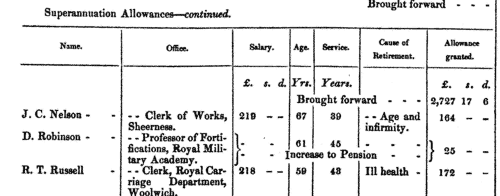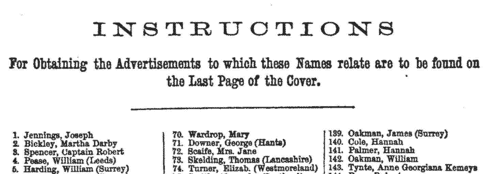Pake Surname Ancestry ResultsOur indexes 1000-1999 include entries for the spelling 'pake'. In the period you have requested, we have the following 52 records (displaying 41 to 50): Single Surname Subscription | | | Buying all 52 results of this search individually would cost £294.00. But you can have free access to all 52 records for a year, to view, to save and print, for £100. Save £194.00. More... |
These sample scans are from the original record. You will get scans of the full pages or articles where the surname you searched for has been found. Your web browser may prevent the sample windows from opening; in this case please change your browser settings to allow pop-up windows from this site. Maldon Poll: Voters Resident in Maldon and the country
(1826)
On 7 June 1826 and the fourteen following days (Sundays excepted) a poll was held to elect Members of Parliament to represent the borough of Maldon in Essex. The candidates were the Hon. George Mark Arthur Way Allanson Winn (W) of Warley Lodge, who received 1747 votes; Thomas Barrett Lennard (L) esquire of Regent's Park, London, 1454 (or 1455) votes; and Quintin Dick (D) esquire of Curson Street, London, 1401. In all 3113 electors were polled, 2527 living in Maldon and the country, 586 in London and its environs. This poll book is divided into two sections, the 586 voters from London &c being listed separately. The names are listed alphabetically by surname, then christian name(s), occupation (in italics), address; and the right-hand column shows the votes cast. Those who did not vote are not listed.PAKE. Cost: £6.00.  | Sample scan, click to enlarge

| Voters in the Eastern Division of Norfolk, for the parish of Brockdish, near Diss
(1832)
Under the Reform Act of 1832, the County of Norfolk was allotted four Members of Parliament, being two Knights of the Shire for the Eastern Division and two for the Western. The Eastern Division included the hundreds of Blofield, Clavering, Depwade, Diss, Earsham, North Erpingham, South Erpingham, Eynsford, East Flegg, West Flegg, Forehoe, Happing, Henstead, Humbleyard, Loddon, Taverham, Tunstead and Walsham. The franchise was available to freeholders worth 40s a year or over; copyholders and long leaseholders of £10 or more; short leaseholders and tenants of £50 or more: but limited to adult males. Voting took place on 20 and 21 December 1832. This poll book lists the voters for each parish, with the votes cast. Voting was not compulsory, and non-voters are not listed. Each voter had two votes: the votes are indicated in the columns C. (Lord Henry Cholmondeley, 2852); P. (Nathaniel William Peach, 2960); K. (Hon. George Keppel, 3261); and W. (William Howe Windham, 3304). The voters were not necessarily resident in the parish, but derived their franchise from the land there; so some of the names have addresses outside the parish. After the name there may appear the abbreviations cop. for copyholder; oc. for occupier; or le. for leaseholder: the rest are freeholders or annuitants.PAKE. Cost: £6.00.  | Sample scan, click to enlarge

| Voters in the Eastern Division of Norfolk, for the parish of Rushall, near Harleston
(1832)
Under the Reform Act of 1832, the County of Norfolk was allotted four Members of Parliament, being two Knights of the Shire for the Eastern Division and two for the Western. The Eastern Division included the hundreds of Blofield, Clavering, Depwade, Diss, Earsham, North Erpingham, South Erpingham, Eynsford, East Flegg, West Flegg, Forehoe, Happing, Henstead, Humbleyard, Loddon, Taverham, Tunstead and Walsham. The franchise was available to freeholders worth 40s a year or over; copyholders and long leaseholders of £10 or more; short leaseholders and tenants of £50 or more: but limited to adult males. Voting took place on 20 and 21 December 1832. This poll book lists the voters for each parish, with the votes cast. Voting was not compulsory, and non-voters are not listed. Each voter had two votes: the votes are indicated in the columns C. (Lord Henry Cholmondeley, 2852); P. (Nathaniel William Peach, 2960); K. (Hon. George Keppel, 3261); and W. (William Howe Windham, 3304). The voters were not necessarily resident in the parish, but derived their franchise from the land there; so some of the names have addresses outside the parish. After the name there may appear the abbreviations cop. for copyholder; oc. for occupier; or le. for leaseholder: the rest are freeholders or annuitants.PAKE. Cost: £6.00.  | Sample scan, click to enlarge

| Runaway Convicts, New South Wales (1836)
Many convicts transported to Australia subsequently absconded from custody or from farmers or traders with whom they had been put to work. The Principal Superintendent of Convicts for New South Wales issued detailed notices to the public 'to use their utmost exertion in apprehending and lodging them in safe custody' and warning against harbouring or employing them. The lists give full name (surname first); name of the transport ship by which the convict had been deported to Australia; number; age; birthplace; trade or profession; height; appearance (complexion, hair, eyes); and a brief description of how or where absconded. January 1836.
PAKE. Cost: £6.00.  | Sample scan, click to enlarge

| New Superannuation Allowances: Excise Officers
(1847)
The annual return for 1847 of 'Allowances or Compensations granted as Retired Allowances or Superannuations in all Public Offices or Departments' lists new compensation allowances (usually for loss of office under reorganization), superannuation allowances (for retirement), and temporary allowances (for sickness or accident) arising during the year; and the cessation of such allowances by death (or occasionally because the individual has been re-employed, or the allowance has remained unclaimed for six years). The format of the returns varies from department to department, but generally the details of a new allowance give full name or surname and initials, office, age, length of service, affliction, and rate of allowance. The lists of deaths give full name or surname and initials, office, date of death, and the amount paid in the year. Throughout the death returns the column 'annual amount' means 'the amount actually paid out during 1847', rather than the yearly amount of the allowance.
PAKE. Cost: £6.00.  | Sample scan, click to enlarge

| New South Wales Intestates
(1851)
The probate courts of the Australian colonies furnished returns of estates of deceased intestates, giving full name, colonial residence, supposed British or foreign residence of family (often unknown, or left blank), amount of the estate and how much had been disbursed and how. The date of death is often stated, and if by accident, suicide or crime. Names were carried forward from return to return until the estate was expended or exhausted. PAKE. Cost: £6.00.  | Sample scan, click to enlarge

|  Persons of standing recommending London police recruits
(1843-1857) Persons of standing recommending London police recruits
(1843-1857)
The Metropolitan Police Register of Joiners (MEPO 4/334) lists policemen joining the force 1 January 1843 to 1 April 1857 (warrant numbers 19893 to 35804). The register is alphabetical, in so far as the recruits are listed chronologically grouped under first letter of surname. It gives Date of Appointment, Name, Number of Warrant, Cause of Removal from Force (resigned, dismissed, promoted or died), and Date of Removal. Although the register was closed for new entrants at the end of 1842, the details of removals were always recorded, some being twenty or more years later. Those recruits not formerly in the police, the army, or some government department, were required to provide (normally) at least two letters of recommendation from persons of standing, and details of these are entered on the facing pages. Where a recruit was only recently arrived in the metropolis, the names and addresses of the recommenders can be invaluable for tracing where he came from. Those recruits not formerly in the police, the army, or some government department, were required to provide (normally) at least two letters of recommendation from persons of standing, and details of these are entered on the facing pages: the names in these are indexed here (the police recruits are indexed separately and not included here). Recruits transferred from other forces or rejoining the force did not normally need recommendations - in the latter case, former warrant numbers are given - but some recommendations are from police inspectors, even other constables. Recruits coming from the army sometimes have general military certificates of good conduct, but most often have a letter from their former commanding officer; recruits recommended by government departments (most often the Home Office) similarly have letters from the head of department. But the great majority of the names and addresses in these pages are of respectable citizens having some sort of personal acquaintance with the recruit. Where more than two recommendations were provided, the clerk would only record one or two, with the words 'and others'. Tradesmen are sometimes identified as such by their occupations; there are some gentry. Although the bulk of these names are from London and the home counties, a scattering are from further afield throughout Britain and Ireland. PAKE. Cost: £8.00.  | Sample scan, click to enlarge

| Unclaimed Money and Property
(1864)
Gun & Co. of 17 Charlotte Street, London, published this 'List of Next of Kin & Heirs, &c., who have been Advertised for in the English, Irish, Scotch, United States of America, Canadian, Australian, East and West Indian, and other Newspapers, since 1704. Money & Property to the value of many Millions Sterling want Claimants'. The list of 4076 names gives surname, christian name, and, occasionally, locality. Copies of the actual advertisements were furnished to enquirers by the company at a cost of six shillings. PAKE. Cost: £6.00.  | Sample scan, click to enlarge

| Disputed Estates
(1886)
Notices from the Court of Chancery as to the disposition of disputed estates in England and Wales.PAKE. Cost: £6.00.  | Sample scan, click to enlarge

| Estates of the Deceased
(1886)
Distribution of the assets of the deceased: giving the names of the deceased and trustees &c. England and WalesPAKE. Cost: £6.00.  | Sample scan, click to enlarge

|
Research your ancestry, family history, genealogy and one-name study by direct access to original records and archives indexed by surname.
|













